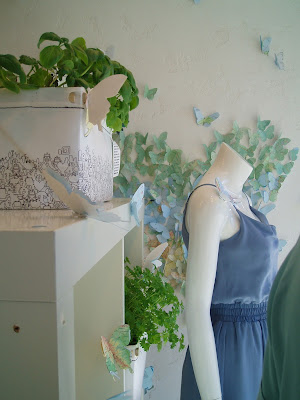One of the things that Fair JAKE loves is
making our set at markets and our studio really reflect our aesthetic, customer
and design. We have so much to learn in regards to merchandising, but we know
that it is an important part of business and sales. Especially now, with
everyone moving faster and basing their impressions and recall off of images,
visual merchandising is becoming an increasingly important tool to stand out
among the masses. We figured we’d ask someone who is extremely well versed in
this topic – our friend Leigha Robinson.
Where did you go to school?
I’m a recent graduate of Blanche Macdonald’s
Fashion Merchandising program. I feel like it’s worth noting that I’m
also a student of life, having done lots of globetrotting and exploring global
culture. That has taught me so much about people and fashion.
What do you think is the most
overlooked and underestimated element of visual merchandising?
There are two things, budget and execution
time. Usually businesses spend the least amount of money on window
displays and creative objects/layout in a store. Conversely, the
atmosphere and inspiration that the visual merchandising evokes has a huge
effect on a buyer’s experience and motivation to purchase.
A successful store layout and window display
is a labour of love, and requires hours of work to accomplish to look
flawless. Business owners and customers alike always see the finished
look. Effective visual merchandising requires both a logical understanding
of a plan of action, and creative skill to make it aesthetically pleasing.
Do you think visual
merchandising can make or break a business?
Absolutely I do. Visual merchandising
is any method used to support the sale of product, which now includes e-commerce
and social media, as well as the more traditional floor plans and window
displays. People react first with their eyes. Today, especially in
a city like Vancouver, there is more than enough of a selection of clothing for
people to choose from. The initial impression that a store or website
makes on a customer can heavily influence whether or not they will choose to
invest in a particular retailer.
What do you draw your
inspiration from when it comes to your next display?
Understanding the identity of the brand and
the customer are key for inspiration. Initially when I began this career,
I felt like I had to pull out all the stops and do everything to appease the
business and its clients. Now I can see that there is a story or life
that the company lives individually. When coming up with a window
campaign, it’s as easy as knowing what the customer will relate to, and does it
provide a good image for the business.
People visually play the game of identity
when viewing the world, what is most familiar to us is what we are drawn
to. I like to incorporate nostalgic and recognizable elements when coming
up with my next inspiration. Whatever I come up with will be original
because it is very hard to copy anything exactly, and we all have our own
interpretations of what we see. I like to play on these ideas all the
time.
What companies do you admire
for their merchandising campaigns?
In terms of a company that continually makes
investments into merchandising campaigns, I have been a huge fan of the
American brand Anthropologie for years. They often use up-cycled and
reclaimed objects and hardware for their window and in store displays.
There is always a nature element tied into the design concept, with a
contemporary edge that seems to make a great balance of a “modern urban” look.
Can you give us two simple
visual merchandising tips that could help a small start-up company get their
message across to their customer base?
Think both about what inspires you and what
your customer would like to see. You don’t have to reinvent the wheel to
have memorable impact on people.
Be free to experiment and get hands on.
The best projects are ones that have a personal story behind them.
What are you working on next?
I am thrilled to be creating a window at
Nicole Bridger for the Breakfast Club of Canada, supporting the Strathcona
Community Centre in Vancouver’s East Side. The program gives children a
better start at school by offering a healthy, homemade meal for a $1
donation. Nicole herself will be raising funds for the entire month
of August, for her first triatholon in September. Anything cause to do
with children inspires us all, and I am honoured to be a part of it.
Thanks so much Leigha, for all your fantastic insight and advice! And for everyone else and all the other small business owners out there, hope this provides some inspiration for you!




